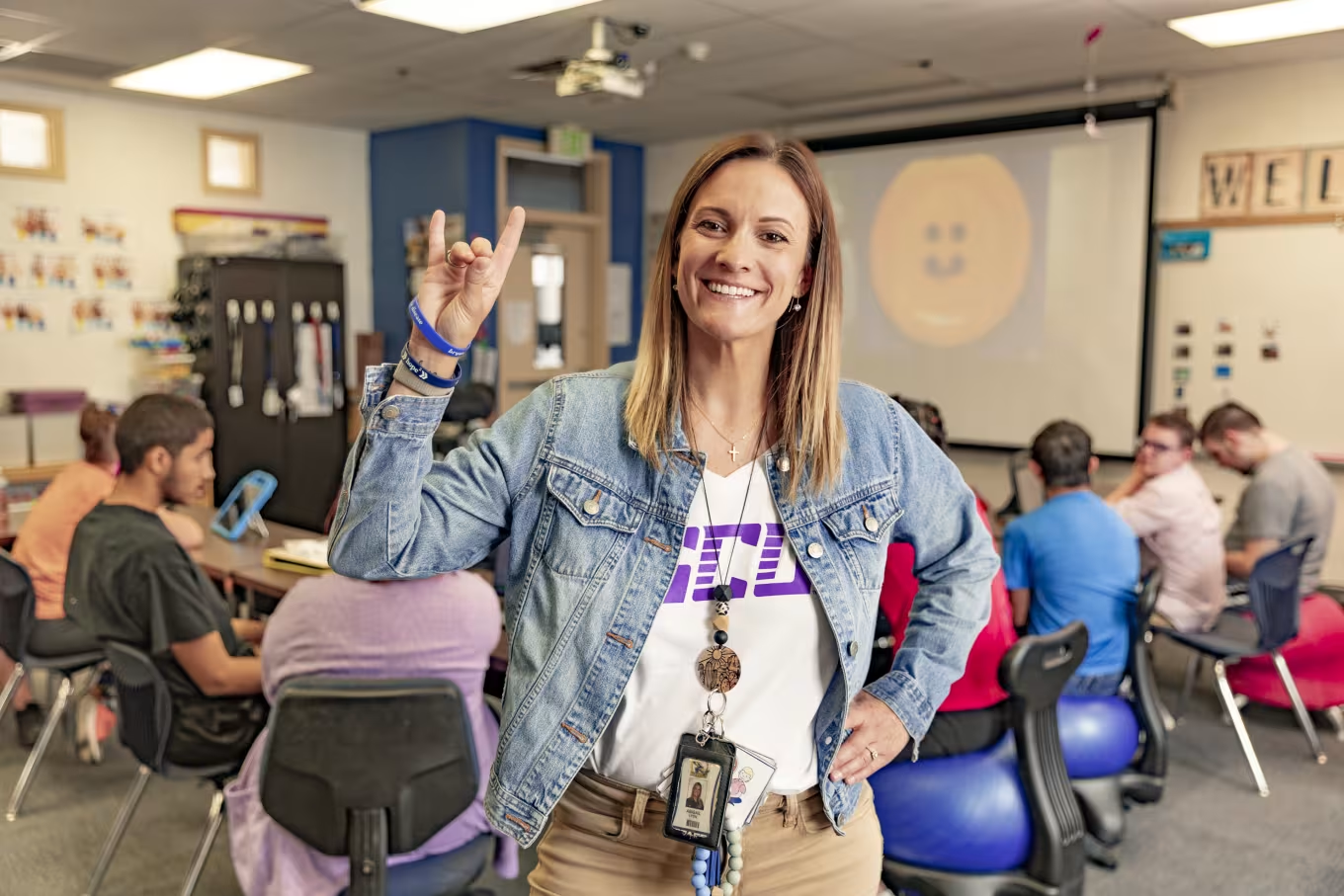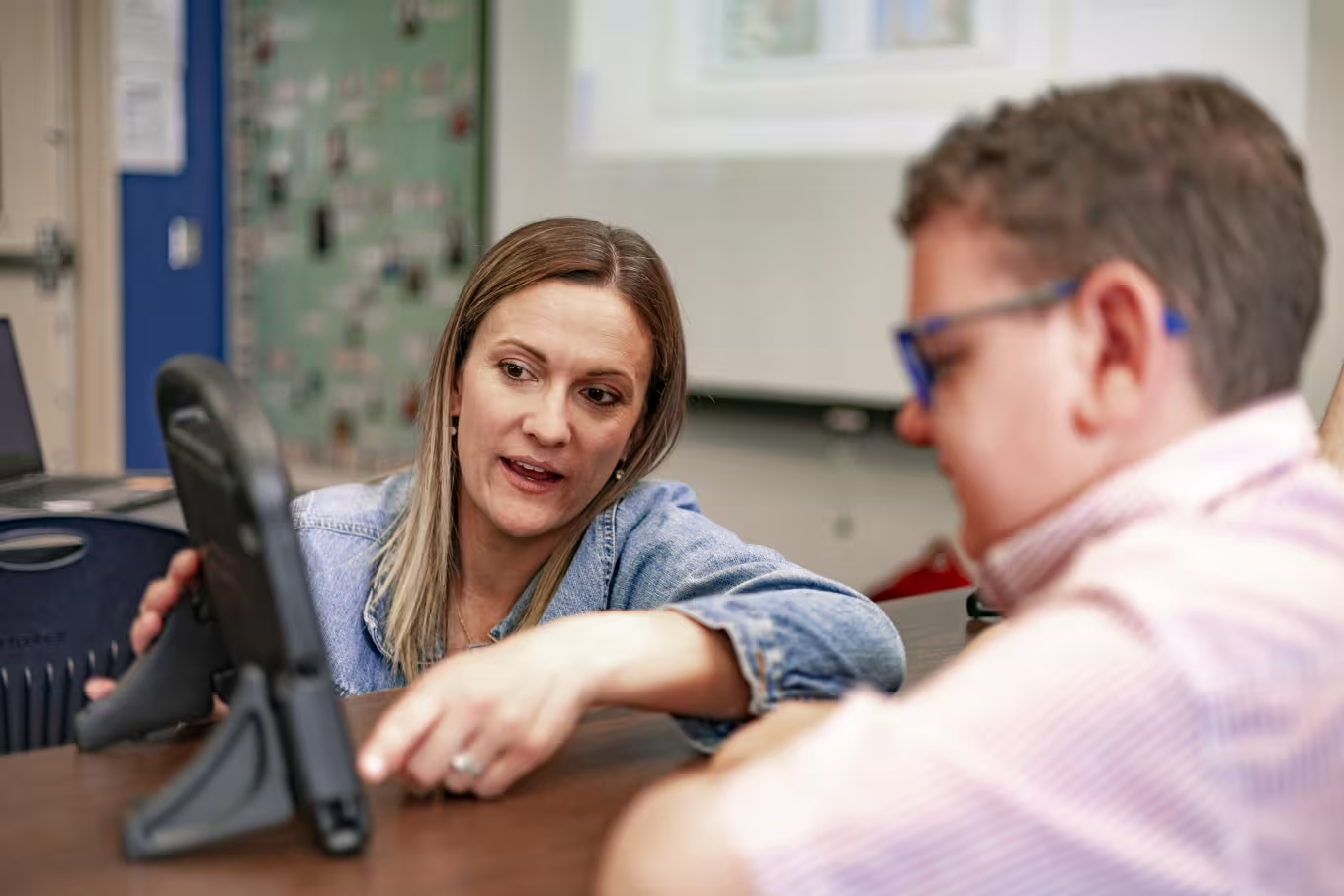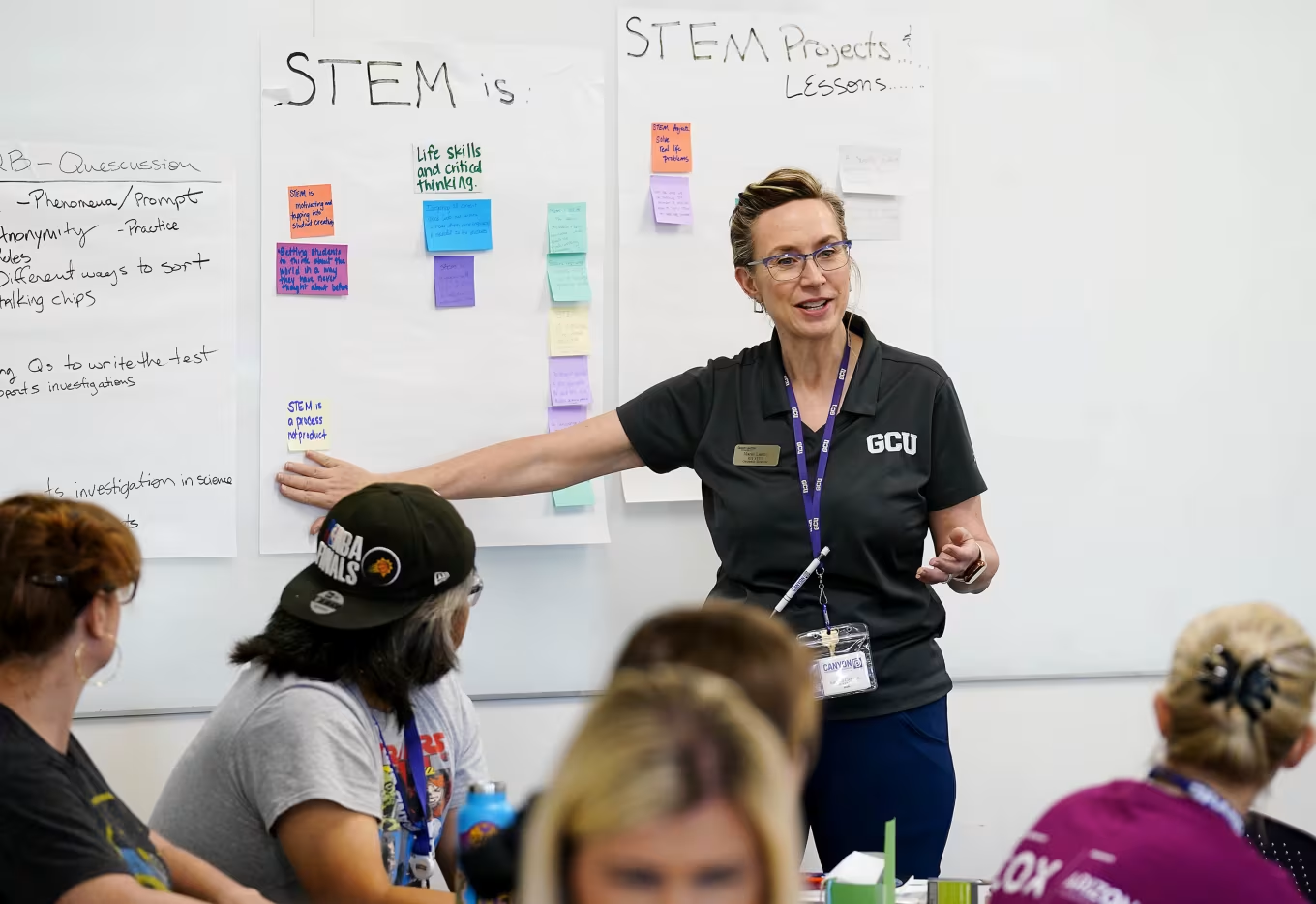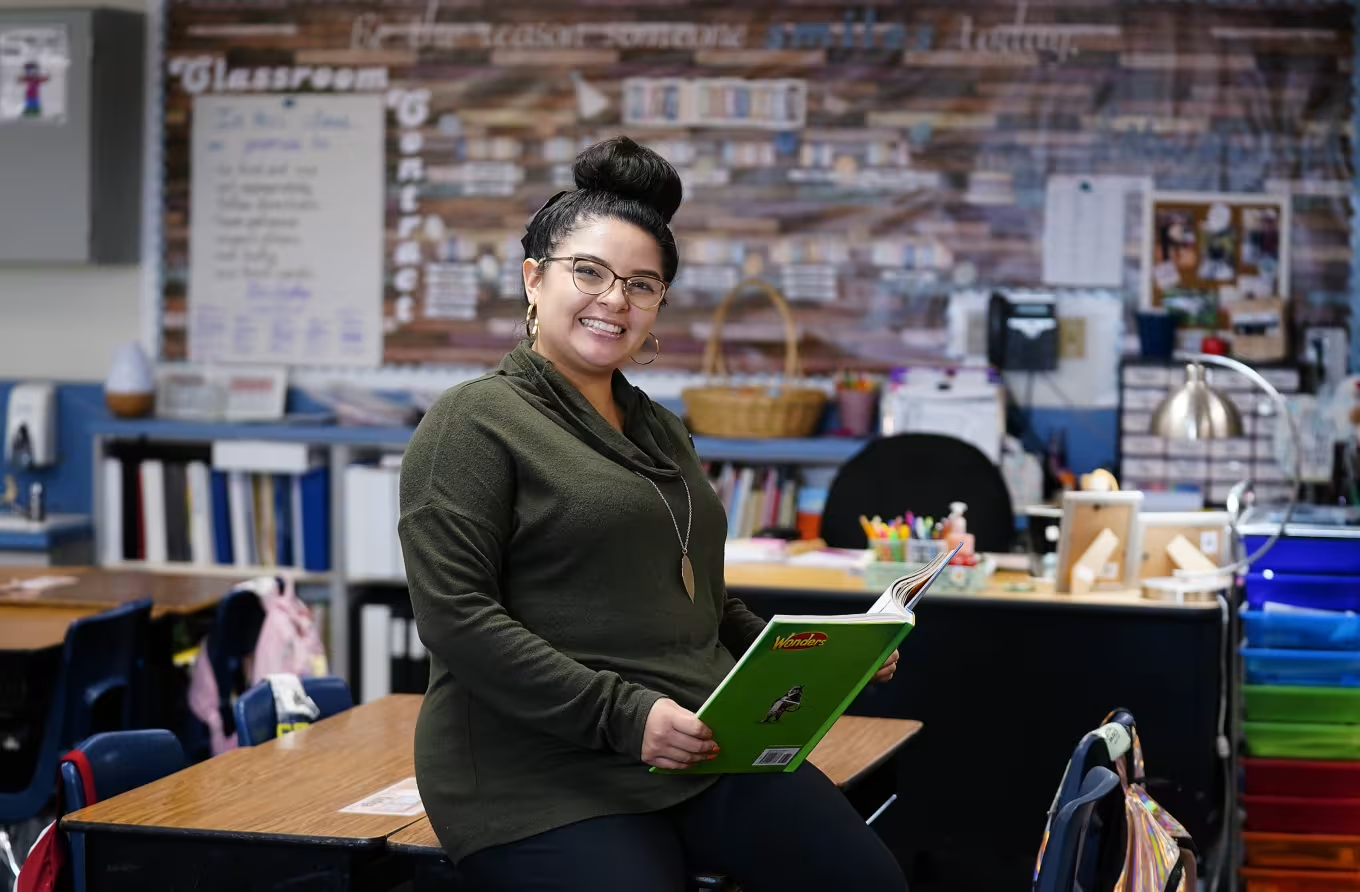Bachelor of Science (BS) in Elementary Education: STEM Emphasis

Bachelor of Science (BS) in Elementary Education: STEM Emphasis
journey today.
STEM includes the areas of science, technology, engineering and mathematics that concentrate on understanding the world and solving problems to transform our everyday lives. By enrolling in the Bachelor of Science in Elementary Education with an Emphasis in STEM degree at Grand Canyon University, you can grow into an elementary STEM teacher while being exposed to diverse occupations within STEM-related fields. This degree can prepare you to become the teacher who potentially fulfills roles within STEM fields.
STEM fields can be seen as innovative and instrumental in shaping the future of the global economy.1 As the world becomes more technologically advanced, the fields are calling for more STEM-qualified teachers who can ignite interest, curiosity and excitement in STEM education, starting at the elementary level.2 This career path can prepare you to introduce STEM awareness early, fostering a passion for learning and discovery in these crucial areas.

In education, STEM college and career readiness begins in elementary and middle schools where teachers are knowledgeable about STEM and passionate about making a difference in a child’s life and the future of our country. Starting students with STEM education in elementary school can improve their overall outcomes.1 You will be taught how to integrate STEM into the classroom with an interdisciplinary approach, promoting problem-solving and creativity through inquiry and project-based, hands-on learning for elementary learners.
This program further connects you to opportunities (such as elementary education field experiences) to apply concepts, theories and research. Field experiences guide you through 130 hours of observational and practice-based learning. For further teacher-candidate experience, you’ll also complete a 15-week student teaching component. These STEM teacher courses can prepare you to move into the next steps.
Upon graduation, you will be eligible to work toward obtaining your elementary education teaching license. Be sure to check the specific licensing requirements in the state you wish to teach. Fill out the form on this page to speak to a university counselor about your needs.

Complete STEM Courses Online
With our online STEM program, you will be taught to advance your skills with access to a flexible and convenient learning platform. Balance your personal and professional commitments while pursuing your passion for teaching STEM subjects.
Experience Traditional Education With On-Campus STEM Classes
Immerse yourself in the world of traditional education with on-campus STEM training. You have the opportunity to directly experience the learning environment provided by a physical campus. Delve into STEM disciplines, collaborate with peers and access resources as you work toward laying the foundation for a future in the fields of science, technology, engineering and mathematics.
All Elementary Education Emphases
Select from our range of emphasis programs available here.

STEM teacher course topics are designed to ignite your curiosity and unravel the mysteries of science, mathematics, technology and engineering through engaging and interactive coursework. From innovative teaching strategies to modern educational technologies, our courses are designed to inspire your passion for STEM by helping you create a learning environment for young minds.
Course topics include:
With a Bachelor of Science in Elementary Education: STEM emphasis, you will be taught the skills needed to pursue potential positions in a variety of fields, such as an elementary education teacher. A STEM education with versatile skills can also ready you for various industries, including civil, mechanical, industrial and electrical engineering. These are the jobs of the future that require innovation, collaboration and critical thinking.1
The U.S. Bureau of Labor Statistics estimates job growth for STEM occupations to increase by about 10.8% from 2022 to 2032, faster than average, accounting for an estimated increase of 1,122,400 jobs in the field.3
Over 1 million
New jobs estimated to open for STEM occupations from 2022 to 2032, as of September 20223
Begin Your STEM Training at an Accredited University
Aligned with the Arizona Department of Education, the BS in Elementary Education with a STEM emphasis supports GCU’s mission to produce career-ready graduates who can bring effective STEM education into schools and classrooms. If you are seeking initial teacher licensure to teach in both elementary and middle grade settings, this program may be for you. The curriculum is institutionally accredited and approved by the Arizona State Board of Education. Courses meet the standards of the Interstate Teacher Assessment and Support Consortium (InTASC), Association for Childhood Education International (ACEI) and International Society for Teaching in Education (ISTE).
Bachelor of Science in Elementary Education: STEM Emphasis FAQs
To help you gain a comprehensive understanding of our STEM elementary teacher BS degree, explore the frequently asked questions below to find the information you need to become a future STEM educator.
Upon completing this program, you will have been taught a strong foundation in STEM education and a comprehensive set of skills that can prepare you to pursue a STEM teaching role in elementary and postsecondary schools. The program's rigorous curriculum, hands-on experiences and guidance from faculty can help you grow, engage and inspire young minds in STEM subjects, making this degree program a great choice for those inspired to become a STEM teacher.
While in many states there is not a separate certification for STEM, this course is well-suited for elementary school teachers who are seeking to attain a STEM endorsement or “add on” to their initial teaching license. This program focuses on valuable insights that can enhance your teaching skills in the STEM subjects. This program can cater to your professional goals and support your journey toward a STEM educator.
Being an elementary STEM education teacher can be valuable, as it can help enhance your teaching methods and prepare you for future workforce needs while also helping your students develop their own critical thinking skills. The value of STEM training ultimately depends on your career goals and the desire to provide a more comprehensive and equitable education. Further, according to the U.S. Bureau of Labor Statistics, STEM occupations, including STEM occupations in postsecondary teaching occupations, had a median annual wage of $97,980 in May 2022.4

Start Your Journey Today
Embrace the path of innovation and be a catalyst for tomorrow's advancements. Start your journey today and empower the next generation of pioneers. To learn more about degree requirements and program qualifications, fill out the form on this page and a university counselor will contact you.
If you are seeking licensure/certification, please refer to the Accreditation and Compliance/State disclosures link for the specific program of interest’s website for your location and/or employment state licensure requirements, per 34 CFR 668.14(b)32 and 668.43(c).
1 Langdon, D. McKittrick, G. Beede, D. Khan, B. Doms, M. (2011, July). STEM: Good Jobs Now and for the Future. U.S. Department of Commerce, Economics and Statistics Administration. Retrieved on Aug. 24, 2023.
2 National Science Board (n.d.). U.S. STEM Workforce: Definition, Size, and Growth. Science & Engineering Indicators. Retrieved on Aug. 24, 2023.
3 COVID-19 has adversely affected the global economy and data from 2020 and 2021 may be atypical compared to prior years. The pandemic may impact the predicted future workforce outcomes indicated by the Bureau of Labor Statistics as well. Accordingly, data shown is effective September 2023, which can be found here: U.S. Bureau of Labor Statistics, Occupational Outlook Handbook, Employment in STEM Occupations, retrieved Sept. 13, 2023.
4 The earnings referenced were reported by the U.S. Bureau of Labor Statistics (“BLS”), STEM Occupations as of May 2022, retrieved on Sept. 13, 2023. Due to COVID-19, data from 2020 and 2021 may be atypical compared to prior years. BLS calculates the median using salaries of workers nationwide with varying levels of education and experience. It does not reflect the earnings of GCU graduates in STEM occupations, nor does it reflect earnings of workers in one city or region of the country or a typical entry-level salary. Median income is the statistical midpoint for the range of salaries in a specific occupation. It represents what you would earn if you were paid more money than half the workers in an occupation, and less than half the workers in an occupation. It may give you a basis to estimate what you might earn at some point if you enter this career. Grand Canyon University can make no guarantees on individual graduates’ salaries. Your employability will be determined by numerous factors over which GCU has no control, such as the employer the graduate chooses to apply to, the graduate’s experience level, individual characteristics, skills, etc., against a pool of candidates.
